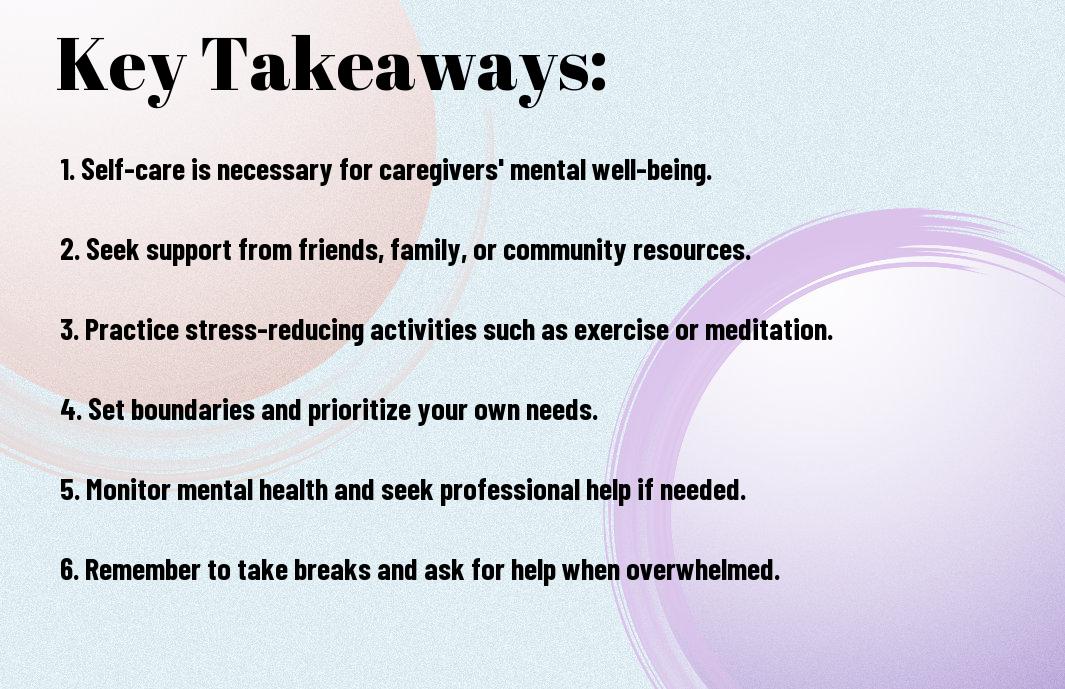Caregivers play a vital role in supporting their loved ones, but often overlook their own mental health needs. It’s imperative for caregivers to prioritize their well-being to provide effective care. This blog post offers valuable insights and tips on how caregivers can support their mental health while juggling caregiving responsibilities at home. For further guidance on this important topic, check out Supporting Your Own Mental Health as a Caregiver.
Key Takeaways:
- Self-care is imperative: Caregivers must prioritize their own well-being to effectively care for others.
- Seek support and resources: It’s crucial for caregivers to reach out for help and access available mental health services.
- Set boundaries: Establishing limits and boundaries in caregiving roles can prevent burnout and maintain balance.
- Practice self-compassion: Being kind and understanding towards oneself is vital to managing the stress and challenges of caregiving.
- Communicate openly: Encouraging open and honest communication with loved ones can help caregivers express their needs and feelings.


Recognizing the Struggle
The Emotional Toll of Caregiving
To support caregivers at home, it is crucial to recognize the emotional toll that caregiving can take. Caregivers often experience a range of complex emotions, from stress and anxiety to guilt and sadness. Witnessing a loved one’s suffering or decline in health can be deeply challenging and can lead to feelings of helplessness and despair. Caregivers may also struggle with balancing their own needs and responsibilities with those of the person they are caring for, which can further exacerbate their emotional burden.
It is necessary for caregivers to acknowledge and validate their emotions, seeking support and self-care to cope with the emotional challenges they face. Ignoring or repressing these feelings can lead to burnout and more severe mental health issues. By recognizing the emotional toll of caregiving and addressing it openly, caregivers can better navigate their emotions and find healthy ways to cope.
Creating a safe space for caregivers to express their feelings without judgment is crucial in supporting their mental well-being. Encouraging open communication and providing opportunities for caregivers to share their struggles can help normalize their experiences and reduce feelings of isolation. By acknowledging the emotional toll of caregiving, caregivers can feel seen and supported in their journey.
Common Mental Health Challenges Faced by Caregivers
With the demanding nature of caregiving, many caregivers face common mental health challenges that can impact their well-being. Depression and anxiety are prevalent among caregivers, stemming from the chronic stress and emotional strain of taking care of a loved one. Feelings of inadequacy or frustration may also manifest, as caregivers grapple with the immense responsibility on their shoulders.
Caregivers may also experience heightened levels of fatigue and insomnia, as the demands of caregiving often disrupt their own self-care routines and sleep patterns. Over time, this can lead to physical exhaustion and mental fatigue, making it even more challenging to cope with daily stressors. It’s important for caregivers to prioritize their own health and well-being, seeking respite care and support services to alleviate some of the burdens they carry.
Additionally, caregivers may struggle with guilt and resentment, feeling torn between their caregiving duties and their personal lives or careers. These conflicting emotions can take a toll on their mental health, leading to feelings of burnout and isolation. By addressing these common mental health challenges openly and proactively, caregivers can work towards a healthier balance and cultivate resilience in their caregiving journey.
Challenges: Caregivers face a myriad of challenges that can impact their mental health, from emotional distress and fatigue to guilt and resentment. It’s necessary to acknowledge these challenges and provide caregivers with the support and resources they need to navigate them effectively. By recognizing and addressing these common mental health challenges, caregivers can prioritize their well-being and sustain their caregiving role with compassion and resilience.
Creating a Supportive Environment
Building a Strong Support Network
One of the most crucial aspects of supporting mental health for caregivers at home is building a strong support network. Caregiving can be emotionally challenging, and having a network of friends, family members, or support groups can provide much-needed emotional support and understanding. Reach out to loved ones and communicate your needs openly. Don’t hesitate to seek professional help or join caregiver support groups where you can connect with others who are going through similar experiences.
Practicing Self-Care at Home
One crucial way to support your mental health as a caregiver is by practicing self-care at home. It’s easy to prioritize the needs of the person you’re caring for, but remember that taking care of yourself is just as important. Make time for activities that bring you joy, whether it’s reading a book, going for a walk, or practicing mindfulness. Setting boundaries, asking for help when needed, and taking breaks are all crucial aspects of self-care that can help prevent burnout and promote overall well-being.
With the demands of caregiving, it can be challenging to prioritize self-care. However, remember that you can’t pour from an empty cup. Taking care of yourself not only benefits you but also enables you to provide better care for your loved one. Whether it’s scheduling regular breaks, delegating tasks to others, or seeking professional help, self-care is an crucial part of maintaining your mental health while caring for someone else.
Managing Stress and Anxiety
All caregivers experience stress and anxiety at some point in their caregiving journey. It is crucial to address these emotions and find healthy ways to cope with them to prevent burnout and maintain emotional well-being. Effective coping mechanisms can make a significant difference in managing stress and anxiety levels for caregivers.
Effective Coping Mechanisms for Caregivers
Mechanisms such as establishing a support system, setting boundaries, and practicing self-care are vital for caregivers to navigate the challenges they face. Building a network of friends, family, support groups, or therapists can provide emotional support and a safe space to share feelings and experiences. Setting boundaries is vital to prevent feelings of overwhelm and resentment. Caregivers need to communicate their needs clearly and learn to say no when necessary. Prioritizing self-care activities, such as exercise, hobbies, or relaxation techniques, can help caregivers recharge and maintain a healthy balance in their lives.
Mindfulness Techniques for Reducing Stress
Mindfulness techniques, such as meditation, deep breathing exercises, and yoga, can be powerful tools for caregivers to reduce stress and anxiety. When practiced regularly, mindfulness can help caregivers stay present, manage their emotions, and cultivate a sense of calm amidst the chaos of caregiving. These techniques can be integrated into daily routines, offering moments of peace and relaxation to counteract the pressures of caregiving responsibilities.
Understanding the importance of mindfulness and incorporating it into daily life can have profound effects on caregivers’ mental well-being. By being more mindful and attentive to the present moment, caregivers can alleviate stress, improve their mood, and enhance their overall quality of life. Mindfulness is a valuable skill that empowers caregivers to respond to challenges with clarity and compassion, promoting resilience and emotional balance in the face of adversity.

Seeking Professional Help
Knowing When to Ask for Help
Professional caregivers often put others’ needs before their own, which can lead to neglecting their mental health. It’s crucial to recognize when you need support and seek help when necessary. If you experience symptoms of burnout, such as constant fatigue, irritability, or difficulty sleeping, it may be time to consult a mental health professional. Remember that asking for help is not a sign of weakness but a brave step towards prioritizing your well-being.
Resources for Mental Health Support
Professional caregivers can access a variety of resources to support their mental health. Therapists, counselors, support groups, or helplines are valuable tools to navigate the challenges of caregiving. These professionals can provide therapeutic interventions, coping strategies, and a safe space to express emotions. Additionally, online platforms offer virtual counseling sessions and mental health resources tailored to caregivers’ specific needs.
This support network can offer a sense of relief and validation, knowing that you’re not alone in your struggles. By exploring different resources and finding the right fit for your mental health needs, you can build resilience and establish healthy boundaries in your caregiving role.
Final Words
On the whole, supporting mental health for caregivers at home is crucial for creating a nurturing environment for both the caregiver and the care recipient. Taking care of someone can be emotionally and physically draining, and it’s crucial for caregivers to prioritize their mental well-being. By seeking support from friends, family, support groups, or mental health professionals, caregivers can have an outlet to express their feelings, receive guidance, and prevent burnout.
Bear in mind, it’s okay to ask for help and take breaks when needed. Self-care is not selfish; it’s necessary for caregivers to recharge and continue providing quality care. By practicing self-compassion, setting boundaries, and communicating openly with their loved ones, caregivers can build a strong support system that enables them to navigate the challenges of caregiving with resilience and grace.
Let’s foster a culture that values and recognizes the incredible work that caregivers do on a daily basis. By raising awareness, offering resources, and promoting self-care practices, we can create a supportive community where caregivers feel seen, heard, and empowered to prioritize their mental health. Together, we can cultivate a more compassionate and understanding world for caregivers at home.
FAQ
Q: Why is supporting mental health important for caregivers at home?
A: Supporting mental health for caregivers at home is crucial because caregiving can be emotionally taxing, leading to stress, burnout, and other mental health challenges.
Q: What are some signs of caregiver burnout?
A: Signs of caregiver burnout include feeling constantly overwhelmed, experiencing changes in sleep or appetite, feeling irritable or hopeless, and neglecting one’s own needs.
Q: How can caregivers prioritize self-care while taking care of others?
A: Caregivers can prioritize self-care by setting boundaries, seeking support from family and friends, taking breaks when needed, practicing relaxation techniques, and seeking professional help when necessary.
Q: What are some resources available for caregivers to support their mental health?
A: There are many resources available for caregivers, including support groups, online forums, counseling services, respite care programs, and helplines like the National Alliance on Mental Illness (NAMI) helpline.
Q: How can family members and friends help support the mental health of caregivers at home?
A: Family members and friends can support caregivers by offering to help with tasks, providing emotional support, listening without judgment, checking in regularly, and encouraging the caregiver to prioritize self-care.



